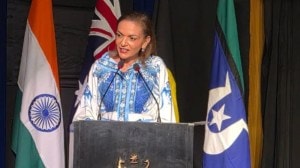Afghans express relief, envy at hijack ending
KABUL, FEBRUARY 10: Afghan officials on Thursday voiced relief at the bloodless end to the London hijack and many ordinary citizens said t...

KABUL, FEBRUARY 10: Afghan officials on Thursday voiced relief at the bloodless end to the London hijack and many ordinary citizens said they would have swapped places with the hostages to escape Taliban rule.
Mullah Hamidullah, president of the state carrier Ariana, said he was happy with the peaceful conclusion to the five-day crisis, but said he now wanted his Boeing 727 aircraft back to fly pilgrims to Mecca.
“We appeal to the government of Britain to return our crew and the plane to us as soon as possible. We need the plane for emergency cases and to take pilgrims on the Haj (pilgrimage to Mecca),” said Hamidullah.
The drama at Stansted Airport ended just before dawn on Thursday without casualties among about 150 people on board.
Afghanistan’s state airline is under UN anti-terrorism sanctions which ban it from foreign flights, but the world body has allowed limited haj flights after an appeal by the Islamic Taliban government.
News about the hijack spread like wildfire around the battered capital, either from short-wave radios monitoring foreign stations such as the BBC or through illicit television sets owned despite a Taliban ban on UN-Islamic propaganda.
Many ordinary Afghans believe the hijacking masked an elaborate attempt by the hijackers, possibly with the connivance of some passengers, to escape the ruins of Afghanistan and seek asylum in Britain.
“The hostages are were lucky now because they are in Britain, though they underwent some ordeal, but it is not comparable to the agonies that they experienced over the past 22 years in Afghanistan. Wish them good luck,” said one Kabul resident.
Another, who also asked for anonymity, said: “we ask the government of Great Britain to allow those desperate Afghans to stay there as refugees if some want to do so.”
“Life is getting worse day by day here so please do not let them down. I am extremely sorry that I was not on the plane myself, otherwise I would have asked the Brits to let me stay in their homeland,” the resident said.
Their reaction reflected the bitterness of many Afghans, especially younger ones, who have remained over the past three years in the Taliban’s experiment to turn a broken country into the world’s most authentic Islamic state.
Living standards are rock bottom, around half of the 1.5 million people in the capital depend on food handouts and Afghanistan’s isolation from the rest of the world has been deepened by sanctions and world refusal to recognise the Taliban.
More than 1.2 million Afghans live as refugees in Pakistan and elsewhere and millions have settled in Europe and elsewhere to escape the ethnic, political and factional bloodshed that has relegated Afghanistan to the poorest of the poor.
Some, like the traffic policemen who man Kabul’s on-off traffic lights dressed in Soviet-era uniforms with salaries that barely buy six loaves of bread, have stayed and tried to eke out a living from the ruins.
“The hijackers should be tried now. They committed an anti-Islamic and international act and must be punished for it,” said one policeman, guiding traffic with a white wooden paddle in his hand.
Other Kabul residents were thankful that the drama was over without bloodshed because Afghans have become so used to the settling of scores through violence.
“I am happy that the scenario is coming to an end peacefully. It is a good news for all of us that nobody was injured or killed in it. We thank the British government for playing its role in ending the drama peacefully,” said Kabul resident Shafiq Ahmad.



- 01
- 02
- 03
- 04
- 05




























